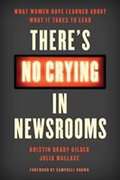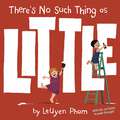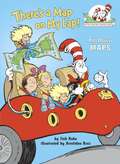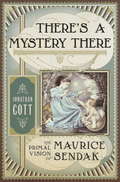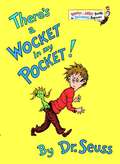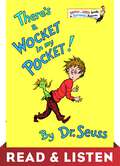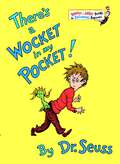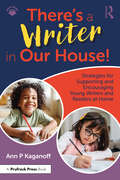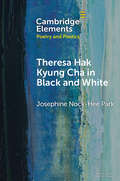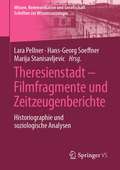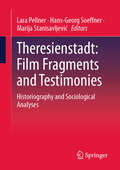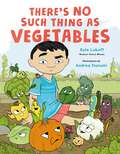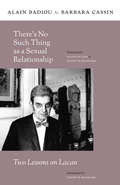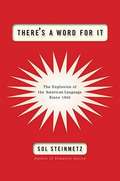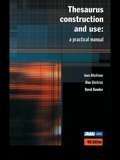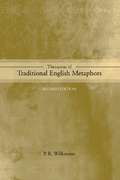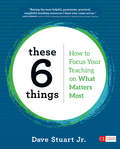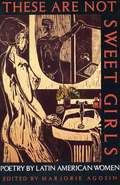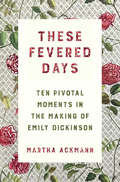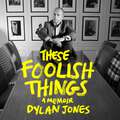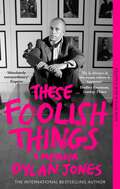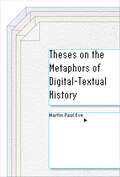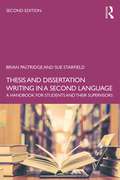- Table View
- List View
There's No Crying In Newsrooms: What Women Have Learned About What It Takes To Lead
by Julia Ann Wallace Kristin Grady GilgerThere’s No Crying in Newsrooms tells the stories of remarkable women who broke through barrier after barrier at media organizations around the country over the past four decades. They started out as editorial assistants, fact checkers and news secretaries and ended up running multi-million-dollar news operations that determine a large part of what Americans read, view and think about the world. These women, who were calling in news stories while in labor and parking babies under their desks, never imagined that 40 years later young women entering the news business would face many of the same battles they did – only with far less willingness to put up and shut up. The female pioneers in “There’s No Crying in Newsrooms” have many lessons to teach about what it takes to succeed in media or any other male-dominated organization, and their message is more important now than ever before. « Less
There's No Such Thing as Little
by LeUyen PhamA heartwarming book that takes a look at all things little . . . and reveals some big surprises with each turn of the page. These things may seem little: A fish. An idea. A snowflake. But what if that little fish was also brave? And that little idea was fantastic? And that little snowflake turned out to be unique in all the world? Featuring die-cut holes in the spirit of Laura Vaccaro Seeger&’s Lemons Are Not Red, There&’s No Such Thing as Little is bright, warm, and endlessly inviting, and will encourage readers of all ages to think BIG about what &“little&” really means.
There's a Map on My Lap!
by Tish RabeThe Cat in the Hat introduces beginning readers to maps-the different kinds (city, state, world, topographic, temperature, terrain, etc. ); their formats (flat, globe, atlas, puzzle); the tools we use to read them (symbols, scales, grids, compasses); and funny facts about the places they show us ("Michigan looks like a scarf and a mitten! Louisiana looks like a chair you can sit in!"). Image descriptions present.
There's a Mystery There: The Primal Vision of Maurice Sendak
by Jonathan CottAn extraordinary, path-breaking, and penetrating book on the life and work and creative inspirations of the great children's book genius Maurice Sendak, who since his death in 2012 has only grown in his stature and recognition as a major American artist, period. Polymath and master interviewer Jonathan Cott first interviewed Maurice Sendak in 1976 for Rolling Stone, just at the time when Outside Over There, the concluding and by far the strangest volume of a trilogy that began with Where The Wild Things Are and In the Night Kitchen, was gestating. Over the course of their wide-ranging and revelatory conversation about his life, work, and the fantasies and obsessions that drove his creative process, they focused on many of the themes and images that would appear in the new book five years later. Drawing on that interview,There's a Mystery There is a profound examination of the inner workings of a complicated genius's torments and inspirations that ranges over the entirety of his work and his formative life experiences, and uses Outside Over There, brilliantly and originally, as the key to understanding just what made this extravagantly talented man tick. To gain multiple perspectives on that intricate and multifaceted book, Cott also turns to four "companion guides": a Freudian analyst, a Jungian analyst, an art historian, and Sendak's great friend and admirer, the playwright Tony Kushner. The book is richly illustrated with examples from Sendak's work and other related images.From the Hardcover edition.
There's a Wocket in My Pocket
by Dr SeussBright and Early Books "... revolutionize the approach to reading for young readers. These delightful books . . . stir the imagination and create a taste for more and more reading materials." - Dr. Margaret B. Parke, Professor. Brooklyn College. The Cat in the Hat proudly presents books for the youngest of the young! The stories are brief and funny, the words are few and easy and have a happy, catchy rhythm, and the pictures are clear and colorful clues to the text.
There's a Wocket in My Pocket: Read & Listen Edition (Bright & Early Books(R))
by Dr. SeussIn this silly Bright and Early Book classic by Dr. Seuss, a young boy goes exploring in his house and finds an array of fun characters! Are you certain there&’s a Jertain in the curtain? Or have you ever had a feeling there&’s a Geeling on the ceiling? From the pesky Nooth Grush on a tooth brush to a sleepy Zelf up on the shelf, There&’s a Wocket in My Pocket will have young readers eager to explore their homes and the wonders of rhyming and wordplay. Combining brief and funny stories, easy words, catchy rhythm, and lively illustrations, Bright and Early Books are an ideal way to introduce the joys of reading to children.This Read & Listen edition contains audio narration.
There's a Wocket in my Pocket (Bright & Early Books(R))
by Dr. SeussIn this silly Bright and Early Book classic by Dr. Seuss, a young boy goes exploring in his house and finds an array of fun characters! Are you certain there&’s a Jertain in the curtain? Or have you ever had a feeling there&’s a Geeling on the ceiling? From the pesky Nooth Grush on a tooth brush to a sleepy Zelf up on the shelf, There&’s a Wocket in My Pocket will have young readers eager to explore their homes and the wonders of rhyming and wordplay. Combining brief and funny stories, easy words, catchy rhythm, and lively illustrations, Bright and Early Books are an ideal way to introduce the joys of reading to children.
There's a Writer in Our House! Strategies for Supporting and Encouraging Young Writers and Readers at Home
by Ann P. KaganoffThere’s a Writer in Our House! is an invitation to parents of children in first grade through fifth grade interested in actively participating in their children’s early literacy learning from the very first steps.Founded upon well-researched literacy instructional methods that have been informed by the author’s clinical perspective as well as her years of experience with many kinds of learners, this book provides a valuable understanding of how both writing and reading contribute to child development in multiple areas. Chapters provide background concepts regarding grammar and specific critical thinking skills in both writing and reading as well as customizable, child-centered activities used to practice and build writing and reading comprehension skills.You will learn how to advance and encourage your child’s learning and communication skills by highlighting important literacy areas such as vocabulary development, background knowledge, and critical thinking. You will also learn to recognize and track the significant developmental achievements of your child as you proceed from the early to the more complex At-Home activities, as well as receive strategies for how to respond and give feedback in specific situations, such as when a child writes something that makes sense to the child but not to the parent, how to offer feedback that identifies and labels a child’s strengths, and how to collaborate effectively with a child who is just developing new interests or a new willingness to try something that previously seemed “hard.”Practical, accessible, and most importantly, fun, this book is a must-read for all parents, regardless of background, seeking to support their children’s ongoing literacy development confidently and effectively.
Thereby Hangs A Tale: Stories of Curious Word Origins
by Charles Earle FunkHave you ever wondered why there's a bed in bedlam or why politicians utter so much bunk before elections? This book answers such questions in a readable and informative way. charity Saint Jerome, who translated the New Testament into Latin in the fourth century, sought to avoid the use of the ordinary Latin word for "love," amor, because of the distinctly worldly associations attached to that word. It did not agree with his interpretation of agape, in the original Greek, which denotes more nearly brotherly love or the deep affection between close friends. So he substituted, wherever the Greek text would naturally have required amor, one or another rather colorless word, one of them being caritas. Its meaning is "dearness," but, being colorless, it was capable of taking the color of its biblical surroundings and thus came to mean, specifically, Christian love of one's neighbor, and especially of the poor. The English word charity, derived from it, perhaps owes its sense particularly to the great passage in I Corinthians, chapter 13, which begins: "Though I speak with the tongues of men and of angels, and have not charity, I am become as sounding brass, or a tinkling cymbal." c
Theresa Hak Kyung Cha in Black and White (Elements in Poetry and Poetics)
by Josephine Nock-HeeTheresa Hak Kyung Cha in Black and White explores the relation between text, author, and reader – a nexus theorized as the 'apparatus' in Cha's study of cinema – by tracing two key literary intertexts in Dictée: Henry James's 'The Jolly Corner,' a submerged literary resonance in Apparatus, Cha's anthology of film theory, and the writing of Saint Thérèse of Lisieux, a primary intertext at the heart of Dictée. In Cha's film theory, black and white is the flicker of the cinematic apparatus, and the Elements readings consider this contrasting palette in self-reflexive portraits in black and white. This study reads flashes of identification, often in punishing self-encounters, and it dwells on the figure of the martyr to arrive at the death of Theresa Hak Kyung Cha, the patron saint of artists and scholars fascinated by her art and her suffering.
Theresienstadt – Filmfragmente und Zeitzeugenberichte: Historiographie und soziologische Analysen (Wissen, Kommunikation und Gesellschaft)
by Marija Stanisavljevic Hans-Georg Soeffner Lara PellnerIm Ghetto, Durchgangs- und Konzentrationslager Theresienstadt sind, unter erzwungener Beteiligung der Deportierten, filmische Aufzeichnungen entstanden und unter dem Titel „Theresienstadt – Ein Dokumentarfilm aus dem jüdischen Siedlungsgebiet“ bekannt geworden. Als besonders perfider Teil nationalsozialistischer Propaganda wirken diese Aufnahmen bis in die Gegenwart nach: Leugner des nationalsozialistischen Genozids verweisen bis heute auf diesen Film. Im Rahmen des Sammelbandes wird die Sonderstellung Theresienstadts auf unterschiedlichen Ebenen beleuchtet. Neben der Analyse von Zeitzeugeninterviews finden sich soziologische, philosophische und geschichtswissenschaftliche Betrachtungen der Umstände, Zustände und Besonderheiten Theresienstadts.
Theresienstadt: Historiography and Sociological Analyses
by Hans-Georg Soeffner Lara Pellner Marija StanisavljevićIn the ghetto, transit and concentration camp Theresienstadt, film recordings were made with the forced participation of the deportees and became known under the title "Theresienstadt - A Documentary from the Jewish Settlement Area". As a particularly perfidious part of National Socialist propaganda, these recordings continue to have an impact to the present day: Deniers of the National Socialist genocide still refer to this film today. In this anthology, the special position of Theresienstadt is examined on various levels. In addition to the analysis of eyewitness interviews, sociological, philosophical, and historiographical reflections on the circumstances, conditions, and peculiarities of Terezin are included.
There’s No Such Thing as Vegetables
by Kyle LukoffA hilarious new picture book that exposes vegetables for what they truly are—leaves, roots, flowers, and stalks—by National Book Award Finalist and Newbery Honor winner Kyle Lukoff, perfect for fans of the Our Universe series.Chester plans to have a salad for lunch, but in order to do that, he'll need vegetables. So, off he goes to the community garden, except he quickly learns that he won't be dressing a salad anytime soon. Instead, the vegetables start dressing him down. According to them, "vegetables" don't exist!I know what you are thinking: What the bell pepper? Vegetables are totally real! But here's the thing: Kale is just a leaf, broccoli is a flower, potatoes are roots, and celery...well, stalks. Thanks to a lively, sassy cast of talking "veggies," Chester learns a valuable lesson about categories and how they shape our understanding of the world.With a slyly informative text and illustrations that will crack readers up, the schooling in There's No Such Thing As Vegetables will be easy to digest and is a total treat.
There’s No Such Thing as a Sexual Relationship: Two Lessons on Lacan (Insurrections: Critical Studies in Religion, Politics, and Culture)
by Barbara Cassin Alain BadiouPublished in 1973, "L'Etourdit" was one of the French philosopher Jacques Lacan's most important works. The book posed questions that traversed the entire body of Lacan's psychoanalytical explorations, including his famous idea that "there is no such thing as a sexual relationship," which seeks to undermine our certainties about intimacy and reality. In There's No Such Thing as a Sexual Relationship, Alain Badiou and Barbara Cassin take possession of Lacan's short text, thinking "with" Lacan about his propositions and what kinds of questions they raise in relation to knowledge. Cassin considers the relationship of the real to language through a Sophist lens, while the Platonist Badiou unpacks philosophical claims about truth. Each of their contributions echoes back to one another, offering new ways of thinking about Lacan, his seminal ideas, and his role in advancing philosophical thought.
There’s a Word for It: The Explosion of the American Language Since 1900
by Sol SteinmetzFrom the turn of the twentieth century to today, our language has grown from around 90,000 new words to some 500,000—at least, that’s today’s best guesstimate (1936). What accounts for this quantum leap (1924)? In There’s a Word for It, language expert Sol Steinmetz takes us on a supercalifragilisticexpialidocious (1949) joyride (1908) through our nation’s cultural history, as seen through the neato (1951) words and terms we’ve invented to describe it all. From the quaintly genteel days of the 1900s (when we first heard words such as nickelodeon, escalator, and, believe it or not, Ms.) through the Roaring Twenties (the time of flappers, jalopies, and bootleg booze) to the postwar ’50s (the years of rock ’n’ roll, beatniks, and blast-offs) and into the new millennium (with its blogs, Google, and Obamamania), this feast for word lovers is a boffo (1934) celebration of linguistic esoterica (1929). In chapters organized by decade, each with a lively and informative narrative of the life and language of the time, along with year-by-year lists of words that were making their first appearance, There’s a Word for It reveals how the American culture contributed to the evolution and expansion of the English language and vice versa. Clearly, it’s must-reading (1940). And not to disparage any of the umpteen (1918) other language books on the shelf—though they have their share of hokum (1917) and gobbledygook (1944)—but this one truly is the bee’s knees and the cat’s pajamas (1920s).
Thesaurus Construction and Use: A Practical Manual
by Jean Aitchison David Bawden Alan GilchristA practical guide to the construction of thesauri for use in information retrieval, written by leading experts in the field. Includes: planning and design; vocabulary control; specificity and compound terms; structure and relationships; auxiliary retrieval devices; multilingual thesauri; AAT Compound Term Rules. The US ANSI/NISO Z39.19 Thesaurus construction standard is also covered.
Thesaurus of Traditional English Metaphors
by P.R. WilkinsonThis fascinating collection of traditional metaphors and figures of speech, groups expressions according to theme. The second edition includes over 1,500 new entries, more information on first known usages, a new introduction and two expanded indexes. It will appeal to those interested in cultural history and the English language.
These 6 Things: How to Focus Your Teaching on What Matters Most (Corwin Literacy)
by Dave StuartStreamline literacy instruction while increasing student achievement Dave R. Stuart Jr.’s work is centered on a simple belief: all students and teachers can flourish. Yet that seemingly simple goal can feel unattainable when teachers are expected to teach core content within the disciplines and improve literacy in their classrooms. How can teachers and students flourish under so much pressure? Stuart’s advice: Take a deep breath and refocus on six known best practices— establish and strengthen key beliefs, then build knowledge and increase reading, writing, speaking and listening, and argumentation in every content area, every day. These 6 Things is all about streamlining your practice so that you’re teaching smarter, not harder, and kids are learning, doing, and flourishing in ELA and content-area classrooms. In this essential new resource, teachers will receive Proven, classroom-tested advice delivered in an approachable, teacher-to-teacher style that builds confidence Practical strategies for streamlining instruction in order to focus on key beliefs and literacy-building activities Solutions and suggestions for the most common teacher and student "hang-ups" Numerous recommendations for deeper reading on key topics In addition to teaching English and world history for more than a decade, Stuart is well-known for his blog DaveStuartJr.com, which has over 35,000 visitors each month. This popular resource has been a beacon of light for more than 10,000 subscribers who refuse to freak out about the everyday challenges of teaching in a high-stakes era. He presents professional development workshops and institutes for schools around the United States and offers a number of online learning tools and experiences on his website.
These 6 Things: How to Focus Your Teaching on What Matters Most (Corwin Literacy)
by Dave StuartStreamline literacy instruction while increasing student achievement Dave R. Stuart Jr.’s work is centered on a simple belief: all students and teachers can flourish. Yet that seemingly simple goal can feel unattainable when teachers are expected to teach core content within the disciplines and improve literacy in their classrooms. How can teachers and students flourish under so much pressure? Stuart’s advice: Take a deep breath and refocus on six known best practices— establish and strengthen key beliefs, then build knowledge and increase reading, writing, speaking and listening, and argumentation in every content area, every day. These 6 Things is all about streamlining your practice so that you’re teaching smarter, not harder, and kids are learning, doing, and flourishing in ELA and content-area classrooms. In this essential new resource, teachers will receive Proven, classroom-tested advice delivered in an approachable, teacher-to-teacher style that builds confidence Practical strategies for streamlining instruction in order to focus on key beliefs and literacy-building activities Solutions and suggestions for the most common teacher and student "hang-ups" Numerous recommendations for deeper reading on key topics In addition to teaching English and world history for more than a decade, Stuart is well-known for his blog DaveStuartJr.com, which has over 35,000 visitors each month. This popular resource has been a beacon of light for more than 10,000 subscribers who refuse to freak out about the everyday challenges of teaching in a high-stakes era. He presents professional development workshops and institutes for schools around the United States and offers a number of online learning tools and experiences on his website.
These Are Not Sweet Girls: Poetry By Latin American Women (Secret Weavers #7)
by Isabel Allende Marjorie AgosínThis reprint of a White Pine Press classic brings together an astonishing range of work from the turn of the century to the present. Despite cultural maxims encouraging them to be silent, women continue to speak, often through the language of poetry, where there is an abundance of intuition and the possibility of reclaiming power through language. In the work included here, we see how the common threads of courage and inventiveness can be woven into a bright tapestry of women’s voices that presents a true picture of a culture that must create its own history. Over fifty poets, including those well-known, such as Gabriela Mistral, Alfonsina Storni, and Cristina Peri Rossi, and those just emerging are included. Marjorie Agos n, editor of the Secret Weavers series, is well-known as a poet, writer, and human rights activist. She is a professor at Wellesley College in Massachusetts.
These Fevered Days: Ten Pivotal Moments In The Making Of Emily Dickinson
by Martha AckmannAn engaging, intimate portrait of Emily Dickinson, one of America’s greatest and most-mythologized poets, that sheds new light on her groundbreaking poetry. On August 3, 1845, young Emily Dickinson declared, “All things are ready” and with this resolute statement, her life as a poet began. Despite spending her days almost entirely “at home” (the occupation listed on her death certificate), Dickinson’s interior world was extraordinary. She loved passionately, was hesitant about publication, embraced seclusion, and created 1,789 poems that she tucked into a dresser drawer. In These Fevered Days, Martha Ackmann unravels the mysteries of Dickinson’s life through ten decisive episodes that distill her evolution as a poet. Ackmann follows Dickinson through her religious crisis while a student at Mount Holyoke, which prefigured her lifelong ambivalence toward organized religion and her deep, private spirituality. We see the poet through her exhilarating frenzy of composition, through which we come to understand her fiercely self-critical eye and her relationship with sister-in-law and first reader, Susan Dickinson. Contrary to her reputation as a recluse, Dickinson makes the startling decision to ask a famous editor for advice, writes anguished letters to an unidentified “Master,” and keeps up a lifelong friendship with writer Helen Hunt Jackson. At the peak of her literary productivity, she is seized with despair in confronting possible blindness. Utilizing thousands of archival letters and poems as well as never-before-seen photos, These Fevered Days constructs a remarkable map of Emily Dickinson’s inner life. Together, these ten days provide new insights into her wildly original poetry and render a concise and vivid portrait of American literature’s most enigmatic figure.
These Foolish Things: A Memoir
by Dylan JonesFew people can say they have shaped the cultural landscape of the last four decades while crossing paths with some of the most extraordinary personalities on the planet. But then, of course, Dylan Jones isn't just anyone.These Foolish Things captivatingly charts Dylan's life: from his peripatetic childhood and late adolescence in 1970s London - a city then alive with possibility - to his award-winning tenure at what would become one of the most dynamic magazines of its era, GQ. It details how he came to be in that hot seat: a journey through the Swinging London slipstreams of punk and new romanticism, and through i-D, The Face and Arena, which created the platform on which GQ was based, with Dylan as a common denominator.Littered with a gold-star cast of characters - including a who's who of celebrity from David Bowie and Bryan Ferry to Alastair Campbell and Prince Charles, via Samuel L. Jackson, Piers Morgan and Rihanna - this memoir reflects on how GQ became an established style and how Dylan sought to stir up music, politics and fashion.Witty, perceptive and deliciously entertaining, but by turns bravely vulnerable, These Foolish Things is a memoir like no other: a dazzling retelling of the start of the twenty-first century from one of the world's most fascinating media giants.
These Foolish Things: A Memoir
by Dylan JonesFew people can say they have shaped the cultural landscape of the last four decades while crossing paths with some of the most extraordinary personalities on the planet. But then, of course, Dylan Jones isn't just anyone.These Foolish Things captivatingly charts Dylan's life: from his peripatetic childhood and late adolescence in 1970s London - a city then alive with possibility - to his award-winning tenure at what would become one of the most dynamic magazines of its era, GQ. It details how he came to be in that hot seat: a journey through the Swinging London slipstreams of punk and new romanticism, and through i-D, The Face and Arena, which created the platform on which GQ was based, with Dylan as a common denominator.Littered with a gold-star cast of characters - including a who's who of celebrity from David Bowie and Bryan Ferry to Alastair Campbell and Prince Charles, via Samuel L. Jackson, Piers Morgan and Rihanna - this memoir reflects on how GQ became an established style and how Dylan sought to stir up music, politics and fashion.Witty, perceptive and deliciously entertaining, but by turns bravely vulnerable, These Foolish Things is a memoir like no other: a dazzling retelling of the start of the twenty-first century from one of the world's most fascinating media giants.
Theses on the Metaphors of Digital-Textual History (Stanford Text Technologies)
by Martin Paul EveDigital spaces are saturated with metaphor: we have pages, sites, mice, and windows. Yet, in the world of digital textuality, these metaphors no longer function as we might expect. Martin Paul Eve calls attention to the digital-textual metaphors that condition our experience of digital space, and traces their history as they interact with physical cultures. Eve posits that digital-textual metaphors move through three life phases. Initially they are descriptive. Then they encounter a moment of fracture or rupture. Finally, they go on to have a prescriptive life of their own that conditions future possibilities for our text environments—even when the metaphors have become untethered from their original intent. Why is "whitespace" white? Was the digital page always a foregone conclusion? Over a series of theses, Eve addresses these and other questions in order to understand the moments when digital-textual metaphors break and to show us how it is that our textual softwares become locked into paradigms that no longer make sense. Contributing to book history, literary studies, new media studies, and material textual studies, Theses on the Metaphors of Digital-Textual History provides generative insights into the metaphors that define our digital worlds.
Thesis and Dissertation Writing in a Second Language: A Handbook for Students and their Supervisors
by Brian Paltridge Sue StarfieldFully updated and packed with new material, the second edition of Thesis and Dissertation Writing in a Second Language is the ideal guide for non-native speaker students and their supervisors working on writing a thesis or dissertation in English. Considering the purposes of thesis and dissertation of writing alongside writer/reader relationships, this book uses accessible language and practical examples to discuss issues that are crucial to successful thesis and dissertation writing. This edition offers: Insights into the experience of being a doctoral writer, issues of writer identity and writing with authority Typical language and discourse features of theses and dissertations Advice on the structure and organisation of key sections Suggestions for online resources which support writing Extracts from completed theses and dissertations Guidance on understanding examiner expectations Advice on publishing from a PhD Suitable for students from all disciplines, Thesis and Dissertation Writing in a Second Language is essential reading for non-native speaker students looking to complete a thesis or dissertation in English.
